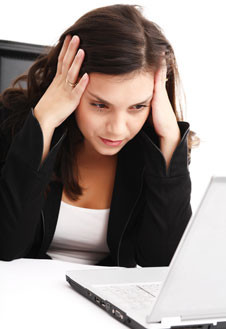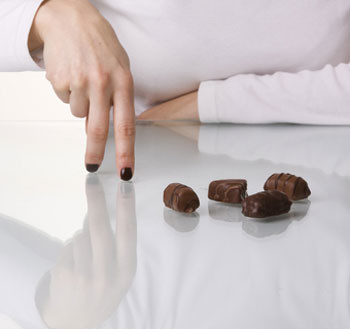Попытки добиться совершенства иногда ведут к stress. Diets are stressful too. Diseases of loved ones - What is our reaction? We start looking for a "cure" for mental pain, fatigue, or melancholy. Alcohol? Drugs? For many women, this medicine is ... food. Excess food naturally leads to weight gain, which, as you might guess, only adds to the stress. How to get rid of stress
How to get rid of stress
 Mini-test. If you answered "yes" to at least three questions, most likely, use food as a means to relieve stress
Mini-test. If you answered "yes" to at least three questions, most likely, use food as a means to relieve stress
Why does stress increase appetite?The content of stress hormones - cortisol and anxiety hormone (its scientific name - "releasing corticotropin") in the body reaches its maximum early in the morning, at 6-8 hours. It is at this time that you feel energetic, you can easily focus on something your attention and concentrate. By lunchtime, the level of stress hormones gradually decreases, and in the afternoon you feel a lack of energy, it's hard for you to concentrate. Usually this happens between 15.00 and 16.00. Biologically, your body begins to prepare for rest, and then to bed after a long busy day. Finally, the content of hormones reaches a minimum during sleep, so you can fully relax. By 2 o'clock in the morning they begin to grow again, preparing you for the morning awakening. Following the natural biorhythm of stress hormones, we should have eaten early and go to bed at 8-9 o'clock in the evening. Overeat in the afternoon is the main cause of stress caused by overweight in women. Time between 15.00 and 24.00 can be called CortiZone: the level of the stress hormone cortisol drops. Today we no longer live in accordance with the natural cycle of stress hormones. When it's time to rest, we still have a lot of urgent things to do, a crush in transport, business dinners and countless household chores. Tired and anxious, we are looking for a source of energy in food and a cure for negative emotions caused by the need to cope with the loads in the second half of the day. It's no wonder that by dinner a person wants to "reward" himself for having managed to survive another day. Women who feel particularly exhausted and overloaded often like to eat even after dinner, late at night. They are looking for a quick, momentary pleasure in the plate.
 Golden rules of nutrition for every daylearn to safely overcome CortiZon and finally break the cycle of overeating. During the main meals, 55-b0% of calories should account for carbohydrates, with preference given to complex carbohydrates (uncooked cereals, vegetables and fruits); 15-20% - for protein and 25% for fat. If you have breakfast before 7 am, have a snack after 3 hours. Be sure to eat something protein (for example, yogurt) and fruit, and lunch should be between 12.00 and 13.00. If you have breakfast after 8 am, ideally between breakfast and lunch you need to have a snack only with fruit. The spring should be 3 hours after lunch. It is necessary that its structure included proteins, carbohydrates and little fat. For example, soup with biscuits, low-fat cottage cheese with fruit, low-fat yogurt or kefir. Try to avoid the "lion's share" of the eaten for a day for the time of CortiZona. Consume the most calories (about 65%) until 5 pm. Watch out for the time! If you eat too much after 8 pm, you will get better.How to tame the "overeating hormones"? People who overeat under the influence of stress, "program" their "Cortisone" problems from the very morning, during breakfast. In the morning they either eat too much carbohydrate and too little protein, or refuse breakfast altogether. Lunch, they also miss or eat quite symbolically: yogurt, a little cottage cheese, a couple of sandwiches or a bowl of soup. It's no wonder that they feel very hungry at the time of the "hour X". If stress awakens your appetite, your task is to develop resistance to it. To do this, you need a nutrition plan for the "dangerous" time of the day - CortiZone. It is also necessary to change your daily habits in order to keep the level of stress hormones as close as possible to the norm and to avoid thoughtless chewing (and the inevitable excess weight associated with it).
Golden rules of nutrition for every daylearn to safely overcome CortiZon and finally break the cycle of overeating. During the main meals, 55-b0% of calories should account for carbohydrates, with preference given to complex carbohydrates (uncooked cereals, vegetables and fruits); 15-20% - for protein and 25% for fat. If you have breakfast before 7 am, have a snack after 3 hours. Be sure to eat something protein (for example, yogurt) and fruit, and lunch should be between 12.00 and 13.00. If you have breakfast after 8 am, ideally between breakfast and lunch you need to have a snack only with fruit. The spring should be 3 hours after lunch. It is necessary that its structure included proteins, carbohydrates and little fat. For example, soup with biscuits, low-fat cottage cheese with fruit, low-fat yogurt or kefir. Try to avoid the "lion's share" of the eaten for a day for the time of CortiZona. Consume the most calories (about 65%) until 5 pm. Watch out for the time! If you eat too much after 8 pm, you will get better.How to tame the "overeating hormones"? People who overeat under the influence of stress, "program" their "Cortisone" problems from the very morning, during breakfast. In the morning they either eat too much carbohydrate and too little protein, or refuse breakfast altogether. Lunch, they also miss or eat quite symbolically: yogurt, a little cottage cheese, a couple of sandwiches or a bowl of soup. It's no wonder that they feel very hungry at the time of the "hour X". If stress awakens your appetite, your task is to develop resistance to it. To do this, you need a nutrition plan for the "dangerous" time of the day - CortiZone. It is also necessary to change your daily habits in order to keep the level of stress hormones as close as possible to the norm and to avoid thoughtless chewing (and the inevitable excess weight associated with it).
 5 ways to do this1. It is necessary psychologically to reconcile with the fact that for objective reasons you feel physical and mental fatigue after 15.00, and do not worry that "a lot of things are ahead, and the forces are already running out." Try to plan your day so that after three o'clock in the afternoon you will have less intense and difficult work. If you do not have a choice, during the Corti Zone, you are forced to work like a bee, break each task into small task-stages, which will be easier to handle. Be careful with products in which you are accustomed to drawing strength and comfort. These "blessings" are given at a high price. Caffeine, nicotine, medications (for example, for weight loss), alcohol, refined sugars and fats generate new problems. Physical activity at any time of the day helps to feel brisker throughout CortiZona. Both regular and "emergency" trainings are the easiest way to simultaneously calm down and cheer up. Ideal in a stressful situation, for example, walk on foot at a fast pace 30 ~ 45 minutes. But even if you step on for a couple of minutes, the stress retreats noticeably. Exercises regulate the level of stress hormones: the body produces beta-endorphins, which act as a natural stimulant. Endorphins block the stress reactions in the body. Learn to mobilize forces in the face of stress. Useful technique of deep breathing, meditation, the ability to switch attention from negative thoughts to neutral or positive. Armed with the nutrition plan for the day (see above "Golden rules of nutrition for every day"). Plan ahead in advance what you will eat for lunch and dinner.
5 ways to do this1. It is necessary psychologically to reconcile with the fact that for objective reasons you feel physical and mental fatigue after 15.00, and do not worry that "a lot of things are ahead, and the forces are already running out." Try to plan your day so that after three o'clock in the afternoon you will have less intense and difficult work. If you do not have a choice, during the Corti Zone, you are forced to work like a bee, break each task into small task-stages, which will be easier to handle. Be careful with products in which you are accustomed to drawing strength and comfort. These "blessings" are given at a high price. Caffeine, nicotine, medications (for example, for weight loss), alcohol, refined sugars and fats generate new problems. Physical activity at any time of the day helps to feel brisker throughout CortiZona. Both regular and "emergency" trainings are the easiest way to simultaneously calm down and cheer up. Ideal in a stressful situation, for example, walk on foot at a fast pace 30 ~ 45 minutes. But even if you step on for a couple of minutes, the stress retreats noticeably. Exercises regulate the level of stress hormones: the body produces beta-endorphins, which act as a natural stimulant. Endorphins block the stress reactions in the body. Learn to mobilize forces in the face of stress. Useful technique of deep breathing, meditation, the ability to switch attention from negative thoughts to neutral or positive. Armed with the nutrition plan for the day (see above "Golden rules of nutrition for every day"). Plan ahead in advance what you will eat for lunch and dinner.









